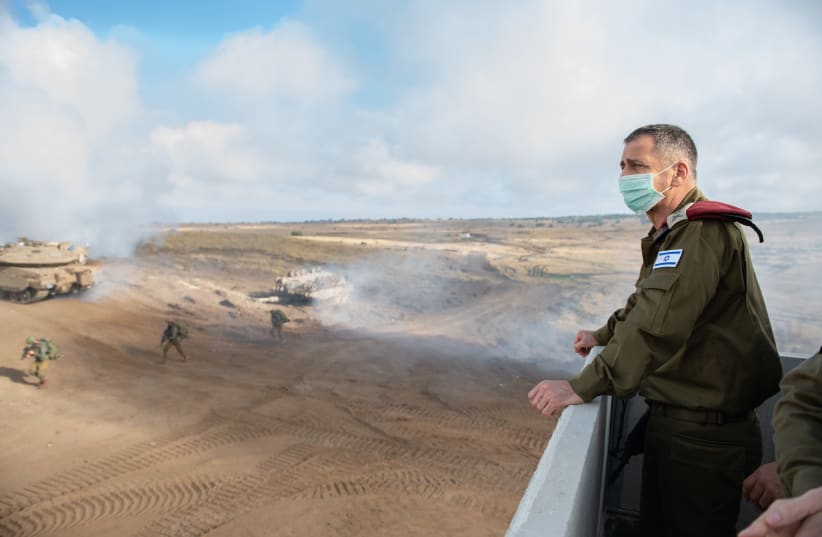A return to the 2015 nuclear deal with Iran, or a “slightly improved” one, would be an operational and strategic mistake for the world, IDF Chief of Staff Lt.-Gen. Aviv Kochavi said Tuesday.
If Iran’s progress in developing advanced centrifuges and enriching uranium are not stopped, it could eventually be “only weeks” away from a nuclear bomb, he said at the Institute for National Security Studies (INSS) annual conference.
The Iran deal would still allow the Islamic Republic to break out to a nuclear weapon in 2030 when the agreement expires, Kochavi said.
The US and others must maintain all sanctions and pressure because Tehran is at its weakest and closest to making real concessions, he said.
Kochavi said he had ordered operational plans to strike Iran’s nuclear program to be ready if necessary, but whether to use those plans and under what circumstances was a decision for the political echelon.
Israel’s strikes in Syria and other undefined parts of the Middle East had created the greatest deterrence Israel has ever known against its enemies, he said.
The IDF had tremendous success in blocking or slowing Iran from transporting advanced weapons into Syria, but it could never let its guard down, Kochavi said.
Moreover, the normalization trend is isolating Iran in ways that it never expected and was not prepared for, he said.
Regarding other challenges, Kochavi warned Hezbollah in Lebanon and Hamas in Gaza, saying in the event of a war, Israel would strike every house that holds weapons “with a deluge of strikes.”
These “terrorist armies” have decided to conceal their weapons in civilian areas on purpose and in every fifth house in Lebanon, he said, adding that all civilians in those areas must immediately evacuate as soon as a war starts because Israel will not give the terrorists immunity just because that is where they are hiding.
“We will follow international law,” he said. “We will warn them in Lebanon and Gaza to let them leave. I already warned you in Lebanon and Gaza: Once war starts, we will let you leave the places you are in, the places you are in have missiles, and you know this.”
Citing explosions in civilian areas from weapons being stored in Lebanon in September and recently in Gaza, Kochavi said the world could no longer doubt Israeli intelligence about Hezbollah and Hamas using civilian areas as a form of “human shields.”
But if civilians stayed, it would be their fault, he said.
Kochavi proposed redefining how international law and war are conceived of. Instead of using the principle known as“proportionality,” countries should think in terms of “the relative relationship” between an attack’s goals and the impact on civilians, he said.
This rethinking is necessary to take on a world in which Hezbollah and Hamas have precision missiles far more powerful than anything anyone dreamed terrorist groups would ever get, while they also systematically abuse the laws of war by hiding in civilian areas and firing their weapons from there, he added.
New cutting-edge intelligence and technological capabilities that help the IDF uncover hidden weapons with unprecedented accuracy would help destroy enemy rockets and avoid civilian deaths, Kochavi said.
“The pace for gathering targets is much faster than ever,” he said, adding that more than 200 officers are dedicated to the sole purpose of vetting selected targets “to help get to a much more decisive point” in battling our enemies.
The Gaza Strip is “a good example of balancing broader strategy with security measures,” Kochavi said.
Deterrence against Hamas has been achieved by integrating “using military force and policies to enhance civilian life,” he said.
Kochavi cited the IDF’s targeted killing of Palestinian Islamic Jihad (PIJ) commander Baha Abu al-Ata and responding to every rocket by hitting targets of significant value to Hamas and PIJ.
On the other hand, he said, it was critical to maintain the policy of allowing Gaza to have increased exports and imports as well as facilitating its receiving financial assistance from Qatar so that the area would not hit the same economic depths it fell to leading into the 2014 Gaza War.
There were limits to how much Israel would allow Gaza to open up economically until the bodies of dead Israelis and live Israeli prisoners were returned, Kochavi said.
“By the summer we will finish the Gaza border wall” to better protect Israel, he said.
On a related note, he said that the IDF was continually uncovering Gaza attack tunnels, including far more than the five or six which might be better known to the public.
In the West Bank, Kochavi said the IDF was developing much more advanced technologies that would increase surveillance and other capabilities to thwart terrorist plots.
“ISIS has not evaporated from the Middle East – not from the Sinai, from Jordan, Egypt and for sure not from Syria,” he said. “It is acting differently, but it is still acting.”
Israel is under constant cyber threat from a range of radical Islamists, Kochavi said.
To meet this challenge, the IDF “significantly increased its cyberattack capabilities and operations” this past year, he said.Speaking before Kochavi, INSS Chairman of the Board Frank Lowy said, "a significant portion of the recent work at the INSS dealt with the pandemic - going forward, the institute will continue to invest resources and efforts in addressing the economic and social challenges facing the State of Israel in a post-COVID world. Recently, Israel has also signed normalization agreements with four Arab countries, agreements that strengthen Israel within the region - I am proud that our institute has begun to cooperate with institutes in these countries."
